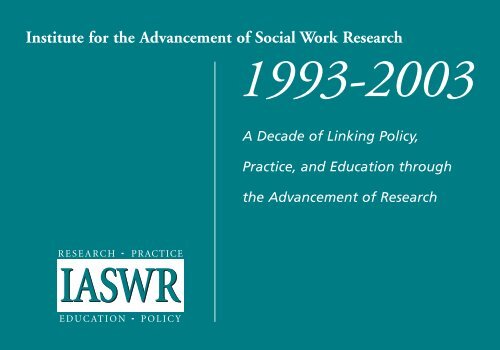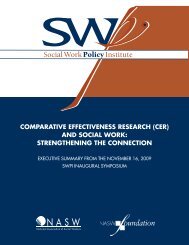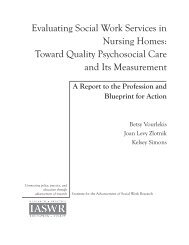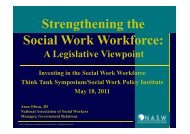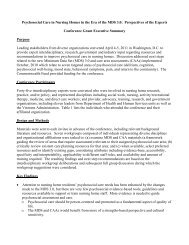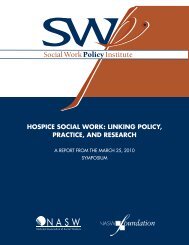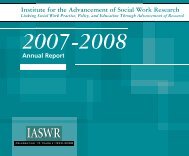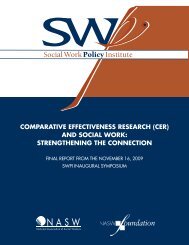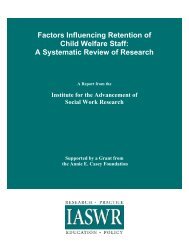Institute for the Advancement of Social Work Research 1993–2003
Institute for the Advancement of Social Work Research 1993–2003
Institute for the Advancement of Social Work Research 1993–2003
Create successful ePaper yourself
Turn your PDF publications into a flip-book with our unique Google optimized e-Paper software.
<strong>Institute</strong> <strong>for</strong> <strong>the</strong> <strong>Advancement</strong> <strong>of</strong> <strong>Social</strong> <strong>Work</strong> <strong>Research</strong>1993-2003A Decade <strong>of</strong> Linking Policy,Practice, and Education through<strong>the</strong> <strong>Advancement</strong> <strong>of</strong> <strong>Research</strong>RESEARCHPRACTICEIASWREDUCATIONPOLICY
<strong>Institute</strong><strong>for</strong> <strong>the</strong><strong>Advancement</strong><strong>of</strong> <strong>Social</strong> <strong>Work</strong><strong>Research</strong>1993-2003A Decade <strong>of</strong> Linking Policy,Practice, and Education through<strong>the</strong> <strong>Advancement</strong> <strong>of</strong> <strong>Research</strong>What is IASWR’s Mission?The <strong>Institute</strong> <strong>for</strong> <strong>the</strong> <strong>Advancement</strong> <strong>of</strong> <strong>Social</strong><strong>Work</strong> <strong>Research</strong> (IASWR) was founded in 1993,in response to “<strong>the</strong> crisis in <strong>the</strong> development <strong>of</strong>research resources” declared by <strong>the</strong> Task Forceon <strong>Social</strong> <strong>Work</strong> <strong>Research</strong> (1991). Five majorsocial work organizations joined toge<strong>the</strong>r toprovide <strong>the</strong> core support to create IASWR, a501 C-3 organization based in Washington,DC. IASWR works to fulfill <strong>the</strong> followingmission:• To streng<strong>the</strong>n <strong>the</strong> research capacity <strong>of</strong> <strong>the</strong>social work pr<strong>of</strong>ession to study problems <strong>of</strong>serious concern to society, and to advance <strong>the</strong>scientific basis <strong>for</strong> solving social problems.• To promote <strong>the</strong> use <strong>of</strong> evidence-based researchto improve practice, program development,policy, and thus, <strong>the</strong> quality <strong>of</strong> life, especially<strong>for</strong> underserved individuals, families, groupsand communities.• To enhance <strong>the</strong> voice <strong>of</strong> <strong>the</strong> pr<strong>of</strong>ession in <strong>the</strong>national scientific community and in publicpolicy determinations, through partnershipswith interdisciplinary and social workorganizations, and outreach to federalagencies.What is <strong>Social</strong> <strong>Work</strong> <strong>Research</strong>?<strong>Social</strong> work research addresses psychosocialproblems, preventive interventions, treatment <strong>of</strong>acute and chronic conditions, and community,organizational, policy and administrative issues.Covering <strong>the</strong> lifespan, social work research mayaddress clinical, services and policy issues. Itbenefits consumers, practitioners, policymakers,educators, and <strong>the</strong> general public by:• Examining prevention and interventionstrategies <strong>for</strong> health and mental health,child welfare, aging, substance abuse,community development, managed care,housing, economic self-sufficiency, familywell-being, and more.• Studying <strong>the</strong> strengths, needs, and interrelationships<strong>of</strong> individuals, families,groups, neighborhoods, and socialinstitutions.• Providing evidence <strong>for</strong> improved servicedelivery and public policiesRapid expansion in research ef<strong>for</strong>ts,enhancement <strong>of</strong> <strong>the</strong> social work researchinfrastructure and a renewed focus onknowledge development has occurred over<strong>the</strong> past decade. A growing number <strong>of</strong> socialworkers are undertaking rigorous researchstudies, and receiving researcher-initiated,2 Tenth Anniversary Report
esearch career development, researchinfrastructure and research training grants.Recent contributions from social work researchinclude studies that address:• Psychosocial assessment and interventionstrategies <strong>for</strong> persons at risk <strong>of</strong> and livingwith cancer• Access to mental health services <strong>for</strong> youthin urban and rural settings• Depression among elders in long term careand home health care settings• HIV/AIDS prevention and intervention inurban communities• School based violence prevention ef<strong>for</strong>tstargeted to youth• Risk factors associated with poverty andmental illness• Community-based child maltreatmentprevention models• Resilience factors <strong>for</strong> diverse groupsexperiencing trauma• Co-occurring disorders <strong>of</strong> substance abuseand mental illness.• Assessment and interventions <strong>for</strong>individuals dealing with <strong>the</strong> multiple riskfactors associated with poverty anddomestic violenceWhat does IASWR do?IASWR provides both new and experiencedresearchers with <strong>the</strong> knowledge and skillsnecessary to prepare successful grants, obtainfunding, and gain knowledge about emergingresearch relevant to social work. It <strong>of</strong>fersresearchers <strong>the</strong> opportunity to participate inworkshops on cutting-edge research techniquesfrom leading researchers and methodologists.Through building and streng<strong>the</strong>ning <strong>of</strong>relationships with federal agencies, and bydemonstrating <strong>the</strong> pr<strong>of</strong>ession’s capacity toconduct quality research, IASWR has beensuccessful in advancing social work researchwithin <strong>the</strong> federal sphere.In its ten-year history, <strong>the</strong> IASWR staff, board<strong>of</strong> directors, consultants and scientific advisorshave worked successfully:• To establish a national social work researchpresence in Washington DC.• To expand opportunities <strong>for</strong> social workresearch.• To mentor social work researchers.• To disseminate findings to in<strong>for</strong>m policyand improve practice.• To represent <strong>the</strong> pr<strong>of</strong>ession in scientific andpolicy communities, including byestablishing linkages with o<strong>the</strong>r relateddisciplines and national organizations.<strong>Institute</strong> <strong>for</strong> <strong>the</strong> <strong>Advancement</strong> <strong>of</strong> <strong>Social</strong> <strong>Work</strong> <strong>Research</strong> <strong>1993–2003</strong>3
Training <strong>Research</strong>ersIn 2000, with support from <strong>the</strong> National<strong>Institute</strong> on Drug Abuse (NIDA), IASWRdeveloped a researcher training curriculumused by NIDA in three regional technicalassistance workshops.In summer 2003 IASWR twice hosted aresearch training workshop, Rigorous andRelevant Qualitative Methods in <strong>Social</strong><strong>Work</strong> <strong>Research</strong>. Over 100 doctoral students,social work educators (from assistantpr<strong>of</strong>essors to deans), and agency-basedresearchers learned cutting-edgemethodology from expert faculty DeborahK. Padgett, New York University, James W.Drisko, Smith College, and SuzanneHeurtin-Roberts, National Cancer <strong>Institute</strong>.Each year IASWR invites federal programstaff and successfully funded researchers toprovide pre-conference technical assistancesessions <strong>for</strong> doctoral students and faculty inconjunction with <strong>the</strong> Society <strong>for</strong> <strong>Social</strong><strong>Work</strong> and <strong>Research</strong> Conference. In 2003 inWashington, DC more than 300participated in <strong>the</strong>se sessions.4 Tenth Anniversary ReportIn 2001, IASWR embarked on implementing aStrategic Plan with three major emphases:Development <strong>of</strong> <strong>Research</strong> and <strong>Research</strong>ers,Bridging <strong>Research</strong> and Practice, and Connecting<strong>Research</strong> and Policy. At this tenth anniversary <strong>of</strong>IASWR’s founding, it is important to celebrateaccomplishments and highlight <strong>the</strong> changes thathave occurred to enhance <strong>the</strong> research enterpriseand knowledge building within <strong>the</strong> pr<strong>of</strong>ession.HIGHLIGHTS 1993-2003DEVELOPMENT OF RESEARCHAND RESEARCHERSIASWR works to develop research andresearchers through:• Advocacy with federal agencies to promoteopportunities <strong>for</strong> social work researchersand to identify <strong>the</strong> contributions fromsocial work research. <strong>Social</strong> work advocacyresulted in NIMH’s funding social workresearch development centers between 1993and 2000, and NIDA’s funding <strong>of</strong> sevenresearch infrastructure developmentprograms in schools <strong>of</strong> social work between2000 and 2003. The overall number <strong>of</strong>social work researchers funded by NIH(including doctoral students, K awards,senior researchers and centers) more thantripled since 1993.• Collaboration with federal partners,provider organizations, foundations, andpr<strong>of</strong>essional organizations to focus onresearch agenda setting, and researchstrategies, and dissemination <strong>of</strong> research.• Dissemination and exchange <strong>of</strong> in<strong>for</strong>mationregarding social work research opportunities,funding, and research findings throughour weekly listserv announcements, andsemi-annual newsletter, IASW<strong>Research</strong>…Reports… Resources.• Offering presentations and workshops atconferences <strong>of</strong> our sponsoring organizationsand at individual social work educationprograms on grant writing, fundingopportunities, and emerging areas <strong>of</strong>research priorities.• Hosting summer research methods trainingworkshops, intensive faculty developmentinstitutes on relevant social work researchissues, and research training curriculumworkshops.• Connecting social work researchers withfederal program <strong>of</strong>ficers.• Making grant writing resources availablethrough <strong>the</strong> IASWR website and listservannouncements www.iaswresearch.org.
BRIDGING RESEARCHAND PRACTICECollaboration with NationalOrganizationsIASWR has built bridges to national groupswith shared agendas to address common issues,identify <strong>the</strong> current state <strong>of</strong> research, and topromote evidence-based practices. Areas <strong>for</strong>research receiving attention include child welfarepractice, social worker recruitment and retention,aging, end <strong>of</strong> life, oncology, women’s health,mental health, substance abuse, veteran’s affairs,health disparities, family violence, economicsecurity, co-occurring disorders, and <strong>the</strong>effectiveness and <strong>the</strong> efficacy <strong>of</strong> social workinterventions.IASWR partners with an array <strong>of</strong> interdisciplinaryorganizations and coalitions, i.e.,<strong>the</strong> Coalition <strong>for</strong> <strong>the</strong> <strong>Advancement</strong> <strong>of</strong> Healththrough Behavioral and <strong>Social</strong> Science <strong>Research</strong>(CAHT-BSSR), <strong>the</strong> Consortium <strong>of</strong> <strong>Social</strong>Science Associations, <strong>the</strong> National Association<strong>of</strong> Public Child Welfare Administrators, <strong>the</strong>Child Welfare League <strong>of</strong> America, <strong>the</strong> NationalChild Abuse Coalition, <strong>the</strong> National Children’sMental Health Training and TechnicalAssistance Center at Georgetown University, <strong>the</strong>Federation <strong>of</strong> Behavioral, Psychological andCognitive Sciences, <strong>the</strong> Decade <strong>of</strong> Behavior, <strong>the</strong>Gerontological Society <strong>of</strong> America, <strong>the</strong> ad-hocAdvocates <strong>for</strong> Quality <strong>Social</strong> <strong>Work</strong> in LongTerm Care and <strong>the</strong> National LeadershipCoalition on <strong>Social</strong> <strong>Work</strong> and Aging.Through <strong>the</strong>se relationships, IASWR helps todevelop social work research initiatives, bringgreater visibility to <strong>the</strong> contributions <strong>of</strong> socialwork researchers, and disseminate and diffuseresearch in<strong>for</strong>mation to <strong>the</strong> social workcommunity.Connecting <strong>Research</strong> and Practice• A series <strong>of</strong> summer institutes <strong>for</strong> BSW andMSW faculty to incorporate recent mentalhealth research findings into social workcurricula were held between 1996 and1998.• IASWR assisted in <strong>the</strong> development anddissemination <strong>of</strong> a gerontological socialwork research agenda which involved inputfrom researchers and practitioners.• With <strong>the</strong> growing focus on ‘evidence-basedpractices’, IASWR tracks federal ef<strong>for</strong>ts,participates in <strong>the</strong> Campbell Collaboration,and in<strong>for</strong>ms <strong>the</strong> social work communityabout resources and relevant researchfindings.• IASWR collaborated with NASW toexamine <strong>the</strong> current state <strong>of</strong> social workShowcasing <strong>Social</strong><strong>Work</strong> <strong>Research</strong>Contributions“Moving Forward: <strong>Social</strong> <strong>Work</strong>Contributions to Mental Health <strong>Research</strong>"a June 2002 NIMH-sponsored, invitationalsymposium featured social work researchpresentations on <strong>the</strong> personal, cultural,and community dynamics <strong>of</strong> <strong>the</strong> promotion<strong>of</strong> mental health and prevention andtreatment <strong>of</strong> mental illness.In July 2003, IASWR convened representativesfrom <strong>the</strong> CDC Injury Center and <strong>the</strong> socialwork pr<strong>of</strong>ession to highlight social workresearch contributions to <strong>the</strong> Injury Center’s<strong>Research</strong> Agenda in regard to preventingdomestic violence and child maltreatmentand <strong>the</strong> interconnectedness <strong>of</strong> <strong>the</strong> multiplelevels <strong>of</strong> violence.<strong>Institute</strong> <strong>for</strong> <strong>the</strong> <strong>Advancement</strong> <strong>of</strong> <strong>Social</strong> <strong>Work</strong> <strong>Research</strong> <strong>1993–2003</strong>5
PROJECT SAFeFollowing a five year ef<strong>for</strong>t led by PrincipalInvestigator Kathleen Ell, to systematicallytest an evidence-based case managementapproach to improve cancer screeningfollow-up adherence, <strong>the</strong> Project SAFeToolkit is now available. Funded by <strong>the</strong>National Breast and Cervical Cancer EarlyDetection Program (NBCCEDP) at <strong>the</strong>CDC, PROJECT SAFe implemented ahealth education counseling and systemsnavigation protocol, adding mental healthscreening and assessment, and intensivepsychosocial counseling <strong>for</strong> women withspecial needs. The target population wasmedically under-served, ethnic minority,low income women from diversepopulations. PROJECT SAFe improvedadherence significantly over baselinerates. The Toolkit includes a selfinstructionaltraining manual which canguide adoption in practice settings orserve as a teaching resource.involvement in psychosocial oncologyresearch and to connect with researchersand practitioners examining effectivedissemination strategies, as part <strong>of</strong> anemerging collaboration with NCI.• Representing social work, participated inNCI and Center <strong>for</strong> <strong>the</strong> <strong>Advancement</strong> <strong>of</strong>Health meeting on “Designing <strong>for</strong>Dissemination,” and CDC and LanceArmstrong Foundation meeting on setting acancer survivor research agenda <strong>for</strong> CDC.Communicating with practitioners,educators and researchers.• IASWR Listserv Announcements is <strong>the</strong> onlyonline newsletter produced specifically<strong>for</strong> <strong>the</strong> social work research community.Reaching out to more than 1500 subscribers(including deans, doctoral programdirectors, agency-based researchers, faculty,and individual researchers) <strong>the</strong> listservprovides an array <strong>of</strong> useful resources includingin<strong>for</strong>mation on funding opportunities, calls<strong>for</strong> papers, conferences, and social workrelevant research findings and reports. Thesuccess <strong>of</strong> <strong>the</strong> listserv has been demonstratedby almost tripling subscribership in threeyears – with readership continuing to growon a weekly basis.• The IASWR website provides a centralplace <strong>for</strong> accessing resources <strong>for</strong> social workresearchers as well as <strong>for</strong> in<strong>for</strong>ming <strong>the</strong>public <strong>of</strong> <strong>the</strong> pr<strong>of</strong>ession’s researchaccomplishments. We plan future expansion<strong>of</strong> <strong>the</strong> website and a collaboration withNASW <strong>for</strong> <strong>the</strong>ir newly launched researchpage in Fall 2003.• IASW<strong>Research</strong>..Reports..Resources is asemiannual newsletter distributed to <strong>the</strong>social work community to providein<strong>for</strong>mation on national research priorities,research resources and IASWR activities.CONNECTING RESEARCHAND POLICYExpand Influence and Collaborationwith Federal AgenciesOver <strong>the</strong> decade IASWR has expanded its workwith federal agencies, beyond <strong>the</strong> National<strong>Institute</strong> <strong>of</strong> Mental Health and <strong>the</strong> National<strong>Institute</strong> on Drug Abuse. IASWR promotesopportunities <strong>for</strong> social work research(ers) with<strong>the</strong> Office <strong>of</strong> Behavioral and <strong>Social</strong> Science<strong>Research</strong> (OBSSR), <strong>the</strong> National Cancer<strong>Institute</strong> (NCI), <strong>the</strong> National <strong>Institute</strong> onAlcohol Abuse and Alcoholism (NIAAA),National <strong>Institute</strong> on Aging (NIA), and <strong>the</strong>6 Tenth Anniversary Report
National <strong>Institute</strong> on Child Health and HumanDevelopment (NICHD) at NIH; <strong>the</strong> Centers<strong>for</strong> Disease Control and Prevention (CDC), <strong>the</strong>Substance Abuse and Mental Health ServicesAdministration (SAMHSA), <strong>the</strong> Administrationon Children and Families, <strong>the</strong> Agency <strong>for</strong>Healthcare <strong>Research</strong> and Quality (AHRQ) and<strong>the</strong> Health Resources and ServicesAdministration (HRSA) at <strong>the</strong> Department <strong>of</strong>Health and Human Services, and with <strong>the</strong>Department <strong>of</strong> Veterans’ Affairs (VA),Department <strong>of</strong> Defense (DOD), and <strong>the</strong>United States Air Force (USAF).IASWR’s work includes sharing findings fromsocial work research ef<strong>for</strong>ts, promoting <strong>the</strong>development <strong>of</strong> social work research agendas;encouraging social work researcher participationon review committees and advisory groups;facilitating <strong>the</strong> development <strong>of</strong> collaborativeef<strong>for</strong>ts and funding opportunities <strong>for</strong> socialwork researchers and practitioners, andpromoting sponsorship <strong>of</strong> social work specificresearch infrastructure building opportunities.Specific <strong>Research</strong> to Policy Ef<strong>for</strong>ts• Co-sponsor <strong>of</strong> <strong>the</strong> biannual Student PolicyPractice Forum on Capitol Hill, whichprovides students with an opportunity tosee first hand <strong>the</strong> involvement <strong>of</strong> socialworkers in <strong>the</strong> policy-making process and<strong>the</strong> importance <strong>of</strong> social work research inthose ef<strong>for</strong>ts.• Active participation in <strong>the</strong> Action Network<strong>for</strong> <strong>Social</strong> <strong>Work</strong> Education and <strong>Research</strong>(ANSWER), a coalition <strong>of</strong> social workgroups advocating <strong>for</strong> federal legislation toenhance social work research opportunities.• Provide input and guidance to federalagencies on critical issues, e.g. addressinghealth disparities, aging research, childwelfare work<strong>for</strong>ce, and psychosocial care innursing homes.• Develop on-going relationships withmembers <strong>of</strong> Congress to promote <strong>the</strong>contributions <strong>of</strong> <strong>the</strong> social work pr<strong>of</strong>ession.Assessing Progress inBuilding InfrastructureIASWR provided staff support <strong>for</strong> <strong>the</strong>NADD Task Force on Administrative<strong>Research</strong> Infrastructures within <strong>Social</strong> <strong>Work</strong>Education Programs which prepared <strong>the</strong>1997 report Challenges and Opportunities<strong>for</strong> Promoting Federally-funded <strong>Research</strong>in <strong>Social</strong> <strong>Work</strong> Programs.David Austin, chair <strong>of</strong> <strong>the</strong> NIMH supportedTask Force on <strong>Social</strong> <strong>Work</strong> <strong>Research</strong> (1988-1991) assessed <strong>the</strong> advances made inaddressing <strong>the</strong> Task Force’s recommendationsin A Report on Progress in <strong>the</strong>Development <strong>of</strong> <strong>Research</strong> Resources in<strong>Social</strong> <strong>Work</strong>. (available on <strong>the</strong> IASWRwebsite)<strong>Institute</strong> <strong>for</strong> <strong>the</strong> <strong>Advancement</strong> <strong>of</strong> <strong>Social</strong> <strong>Work</strong> <strong>Research</strong> <strong>1993–2003</strong>7
Capitol Hill BriefingIn February 2002, Curtis McMillen,Associate Pr<strong>of</strong>essor, George Warren BrownSchool <strong>of</strong> <strong>Social</strong> <strong>Work</strong>, WashingtonUniversity spoke on “The Positive By-Products <strong>of</strong> Adversity” at a CongressionalBriefing, Health in a Stressful Worldsponsored by CAHT-BSSR.What are Sources <strong>of</strong> Support <strong>for</strong>IASWR Projects and ProgramsNational <strong>Institute</strong>s <strong>of</strong> Health• NIMH• NIDA• NIAAA• NCI• Office <strong>of</strong> Behavioral and <strong>Social</strong> Science<strong>Research</strong>Centers <strong>for</strong> Disease Control and Prevention• National Breast and Cervical Cancer EarlyDetection Program• Center <strong>for</strong> Injury Prevention and ControlSubstance Abuse and Mental Health ServicesAdministration• Center <strong>for</strong> Mental Health ServicesDepartment <strong>of</strong> DefenseUnited States Air Force/Department<strong>of</strong> AgricultureNational Child Welfare Resource Centeron Family-Centered PracticeFord FoundationCasey Family ServicesHow Does <strong>the</strong> <strong>Social</strong> <strong>Work</strong>Community Support IASWR?Core support <strong>for</strong> <strong>the</strong> activities <strong>of</strong> IASWR comesfrom leading social work practice, educationand research organizations:• Association <strong>of</strong> Baccalaureate <strong>Social</strong> <strong>Work</strong>Program Directors (BPD)• Council on <strong>Social</strong> <strong>Work</strong> Education(CSWE)• Group <strong>for</strong> <strong>the</strong> <strong>Advancement</strong> <strong>of</strong> DoctoralEducation (GADE)• National Association <strong>of</strong> Deans andDirectors <strong>of</strong> Schools <strong>of</strong> <strong>Social</strong> <strong>Work</strong>(NADD)• National Association <strong>of</strong> <strong>Social</strong> <strong>Work</strong>ers(NASW)• Society <strong>for</strong> <strong>Social</strong> <strong>Work</strong> and <strong>Research</strong>(SSWR)8 Tenth Anniversary Report
Between 1999 and 2003, 52 social workeducation programs have directly supportedour technical assistance, training andcommunication activities. The thirteenhighlighted programs provided funds annually.Adelphi UniversityAndrews UniversityBoston UniversityBryn Mawr CollegeCase Western Reserve UniversityCSU, San BernardinoCSU, StanislausColumbia UniversityFlorida International UniversityFordham UniversityGallaudet UniversityJames Madison UniversityLouisiana State UniversityMichigan State UniversityNew York University2North Carolina Central UniversityOhio State UniversityPortland State UniversityRutgers UniversitySt. Ambrose UniversitySt. Louis UniversitySimmons CollegeSou<strong>the</strong>rn Illinois UniversitySouthwest Texas State UniversitySyracuse UniversityUniversity <strong>of</strong> AlabamaUniversity <strong>of</strong> AlbanyUniversity <strong>of</strong> Arkansas, Little RockUniversity <strong>of</strong> BuffaloUniversity <strong>of</strong> ChicagoUniversity <strong>of</strong> DenverUniversity <strong>of</strong> GeorgiaUniversity <strong>of</strong> HoustonUniversity <strong>of</strong> Illinois, U-CUniversity <strong>of</strong> Illinois, ChicagoUniversity <strong>of</strong> KansasUniversity <strong>of</strong> KentuckyUniversity <strong>of</strong> MarylandUniversity <strong>of</strong> Maryland Baltimore CountyUniversity <strong>of</strong> MichiganUniversity <strong>of</strong> MinnesotaUniversity <strong>of</strong> PittsburghUniversity <strong>of</strong> Sou<strong>the</strong>rn Cali<strong>for</strong>niaUniversity <strong>of</strong> South Carolina1University <strong>of</strong> TennesseeUniversity <strong>of</strong> Texas, AustinUniversity <strong>of</strong> UtahUniversity <strong>of</strong> WashingtonUniversity <strong>of</strong> Wisconsin-MilwaukeeVirginia Commonwealth UniversityWashington UniversityWayne State University1Distribution <strong>of</strong> Listserv2In<strong>for</strong>mation <strong>for</strong> Practice<strong>Institute</strong> <strong>for</strong> <strong>the</strong> <strong>Advancement</strong> <strong>of</strong> <strong>Social</strong> <strong>Work</strong> <strong>Research</strong> <strong>1993–2003</strong>9
WHO ARE WE?Board <strong>of</strong> Directors 2003-2004OfficersAnn Nichols-Casebolt, VirginiaCommonwealth University – PresidentJack Sellers, University <strong>of</strong> North Alabama –Vice PresidentMildred Joyner, West Chester University –Secretary/TreasurerMembersJeane Anastas, New York UniversityGary Bailey, Simmons CollegeFrank Baskind, VirginiaCommonwealth UniversityElizabeth Clark, National Association<strong>of</strong> <strong>Social</strong> <strong>Work</strong>ersAnita Curry-Jackson,Wright State UniversityMartha M. Dore, Adelphi UniversityShanti Khinduka, Washington UniversityWilliam Meezan, University <strong>of</strong> MichiganJean Quam, University <strong>of</strong> MinnesotaJulia Watkins, Council on<strong>Social</strong> <strong>Work</strong> EducationPast PresidentsRino Patti, University <strong>of</strong> Sou<strong>the</strong>rnCali<strong>for</strong>nia/San Diego State UniversityBarbara Berkman, Columbia UniversityLynn Videka, University <strong>of</strong> AlbanyDavid E. Biegel, Case WesternReserve UniversityCurrent StaffJoan Levy Zlotnik, Executive DirectorBarbara E. Solt, Senior Program AssociateBrenda Bustos, Administrative Coordinator10 Tenth Anniversary Report
“<strong>Social</strong> work research as it relates to <strong>the</strong>health <strong>of</strong> individuals sheds lighton <strong>the</strong> behavioral and socialdeterminants <strong>of</strong> wellness anddisease and helps to developeffective interventions <strong>for</strong>improving health outcomes.”— NIH Plan <strong>for</strong> <strong>Social</strong> <strong>Work</strong> <strong>Research</strong>, May 2003, p.5
RESEARCHPRACTICEIASWREDUCATIONPOLICY<strong>Institute</strong> <strong>for</strong> <strong>the</strong> <strong>Advancement</strong> <strong>of</strong><strong>Social</strong> <strong>Work</strong> <strong>Research</strong>750 First Street NE, Suite 700Washington, DC 20002-4241202.336.8385202.336.8351 (FAX)iaswr@naswdc.orgwww.iaswresearch.org


